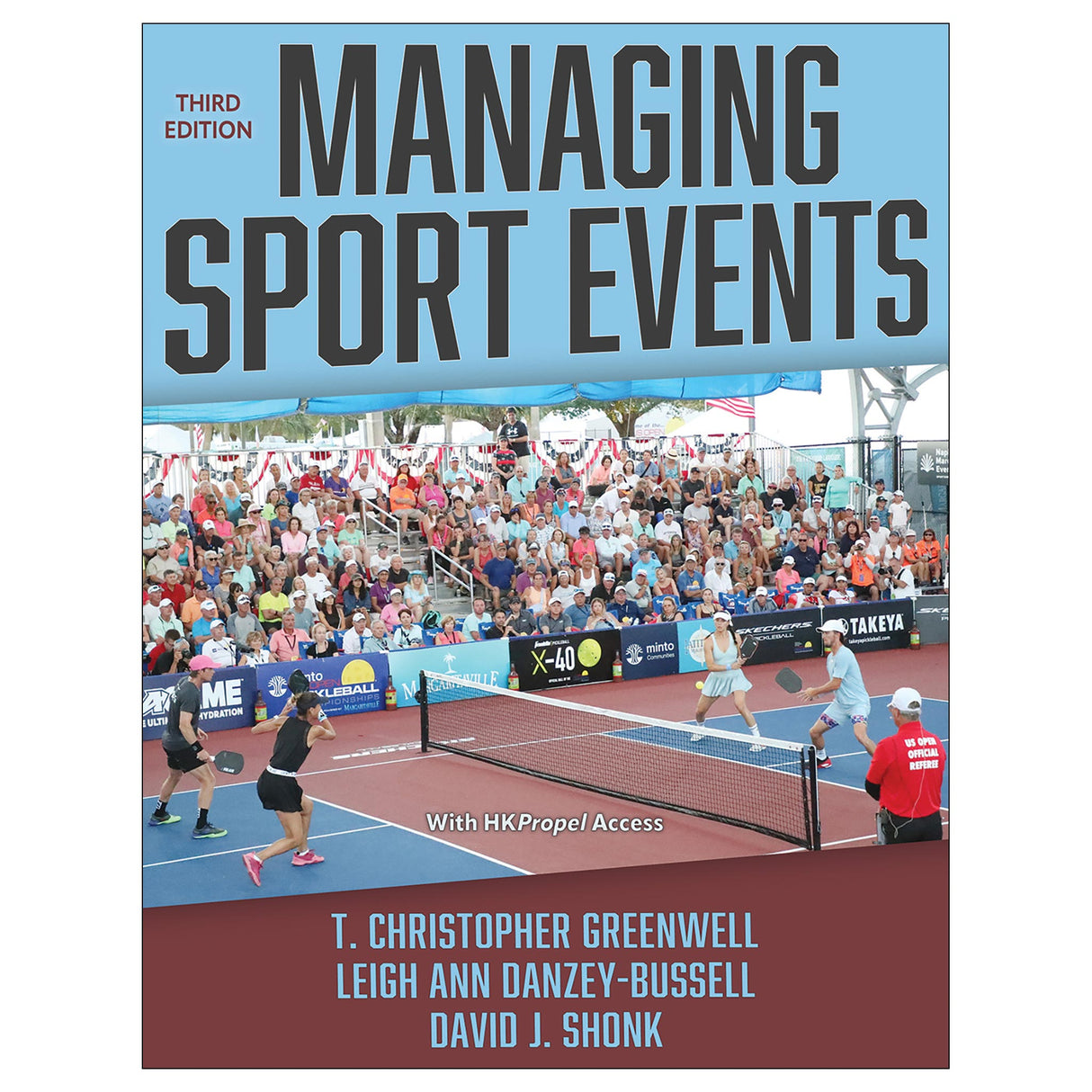Managing Sport Events 3rd Edition Ebook With HKPropel Access
$115.95 CAD

While other texts in this space stray into the area of facility management, Managing Sport Events keeps its focus where it should be by providing a thorough grounding of the entire event management process. Beginning with an overview of event conception and development, the text then moves into the principal planning areas of budgeting, marketing, promotion, sponsorships, and legal and risk management. Later chapters focus on key operational areas such as staffing, event services and logistics, and event-day management, and it closes with postevent details and evaluation.
The third edition includes new and updated content that incorporates plenty of contemporary real-life examples:
- Insights into how event management has been affected by COVID-19 and by the emergence of social media, sustainability efforts, and diversity, equity, and inclusion (DEI) initiatives
- All-new content addressing the role of brand ambassadors, social media influencers, and nontraditional media in promoting events and encouraging fan engagement
- An updated discussion of event sponsorships and how sport organizations are implementing creative activation strategies, pre-event and game-day deliverables, and the latest technologies to maximize exposure and measure effectiveness
- An expanded discussion of contracts and other legal considerations such as compliance with the Americans with Disabilities Act (ADA)
- An expanded section outlining how principles of project management can be used to effectively plan events
- New industry profiles that provide insights into key players and noteworthy happenings in event management
- A brand-new semester-long project in which students plan, prepare, produce, and evaluate a fictional pickleball tournament as well as compile a formal event management plan handbook
- Scenario-based activities in which students make a decision and then see the implications of their choice
- Mini case studies for each chapter with questions to test comprehension
- Sample contracts that represent common agreements encountered in event management
Blending traditional business tenets of sport management with the distinct aspects of event management, Managing Sport Events, Third Edition, prepares readers to manage events with efficiency and ease so that fans and participants alike have lasting game-day memories.
Note: A code for accessing HKPropel is included with this ebook.
Audience
Textbook for introductory courses in sport event management and facility management; reference for academic libraries and sport event professionals.Career Paths in Sport Event Management
Skills, Knowledge, and Traits for Success
Sport Events Versus Nonsport Events
Sport Tourism
Relationship Between Sport Event Management and Sport Facility Management
Types of Sporting Events
Summary
Learning Activities
Chapter 2. Event Conceptualization, Planning, and Project Management
Event Leadership
Decision Making in Event Management
Brainstorming in Event Management
Purpose of the Event
Choosing the Type of Event
SWOT Analysis
Developing a Mission for the Event
Setting Goals and Objectives
Planning Logistics
Thinking Creatively and Planning for Uniqueness
Planning for Diversity, Equity, and Inclusion
Sustainable Sporting Events
Planning Promotional and Ancillary Components
Planning for Contingencies
Project Management
Event Planning Blunders
Summary
Learning Activities
Chapter 3. Event Bidding
Economic Impact
Sports Commissions
Sport Event Trends
Bidding Process
Feasibility Studies
Bid Documents
Summary
Learning Activities
Chapter 4. Event Budgeting
Event Budgeting Process
Types of Revenues
Types of Expenses
Controlling Costs
Cash Flow and Cash Management
Summary
Learning Activities
Chapter 5. Event Sponsorship
Sponsorship
Benefits of Event Sponsorship
Activation
Sponsorship and Technology
Ensuring DEI
Evaluating Your Event
Summary
Learning Activities
Chapter 6. Event Marketing
Marketing Sport Events
Developing a Marketing Plan
Market Research and Analysis
Understanding Consumers
Setting Marketing Goals and Objectives
Market Segmentation and Target Markets
Branding the Event
Event Pricing
Distribution
Event Promotion
Sales
Creating Community Support
Summary
Learning Activities
Chapter 7. Event Publicity
Sport Publicity
Publicity
Media Relations
The Five Rs of Media Relations
Social Media
Social Media Strategy
Evaluating Success
Summary
Learning Activities
Chapter 8. Legal Issues
Contracts 101
Technology and Contracts
Negotiating Contracts
Types of Contracts
Common Clauses
Waivers and Releases
Permits and Licenses
Assessing Your Insurance Needs
Federal Legislation
Diversity, Equity, and Inclusion
Summary
Learning Activities
Chapter 9. Risk Management and Negligence
Risk Management Process
Risk Management Planning
Threats to Events (Types of Emergencies)
Understanding and Managing Crowds
Crowd Management Plans
Negligence
Summary
Learning Activities
Chapter 10. Event Staffing
Organizational Chart
Identifying Necessary Staff
Scheduling Staff
Considering Outsourcing Staff
Managing and Motivating Staff
Personal Management Style and Effective Leadership
Management Meetings
Communicating With Staff
Volunteers
Team Building
Summary
Learning Activities
Chapter 11. Event Services and Logistics
Event Timeline
Event Registration
Ticket Sales
Food and Beverage Operations
Hospitality Services
Waste Management Services
Custodial Services
Transportation Services
Lighting
Vendor Relationships
Event Facility Selection
Customer Service
Awards Ceremonies
Summary
Learning Activities
Chapter 12. Event Day Management
Managing Event Day
Easily Missed Details
Event Day Tools
Managing Staff
Managing Spectators
Managing Participants
Managing Sponsors
Consumer Experience
Customer Service
Health and Safety Protocols
Event Day Technologies
Summary
Learning Activities
Chapter 13. Postevent Details and Evaluation
Postevent Promotions
Postevent Media Coverage
Sponsor Follow-Up
Postevent Debriefing
Event Evaluation
Evaluating Outcomes and Objectives
Measuring Economic Impact
Summary
Learning Activities
Relationship between sport event management and sport facility management
Sustainable sporting events
Understanding and managing crowds
All ancillaries are free to adopting instructors through HKPropel.
Instructor guide. Includes a sample syllabus, recommended classroom activities, and sample responses to end-of-chapter learning activities and case study questions featured in the text. Also provided is an overview of the student event planning project and how to incorporate it into the course throughout the semester.
Test package. Contains nearly 400 questions in true-false, fill-in-the-blank, essay and short-answer, matching, and multiple-choice formats. The files may be downloaded for integration with a learning management system or printed for use as paper-based tests. Instructors may also create their own customized quizzes or tests from the test bank questions to assign to students directly through HKPropel. Multiple-choice and true-false questions are automatically graded, and instructors can review student scores in the platform.
Chapter quizzes. Contains ready-made quizzes (9-10 questions each) to assess student comprehension of the most important concepts in each chapter. Each quiz may be downloaded or assigned to students directly through HKPropel. The chapter assessments are automatically graded, and instructors can review student scores in the platform.
Presentation package. Features approximately 250 PowerPoint slides of text, artwork, and tables from the book that can be used for class discussion and presentation. The slides in the presentation package can be used directly within PowerPoint or printed to make handouts.
Instructors also receive access to all student materials in HKPropel. For Managing Sport Events, Third Edition, this includes student learning activities consisting of a semester-long event planning and execution project, scenario-based activities, mini case studies, and sample contracts.





